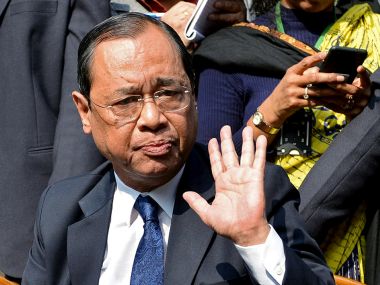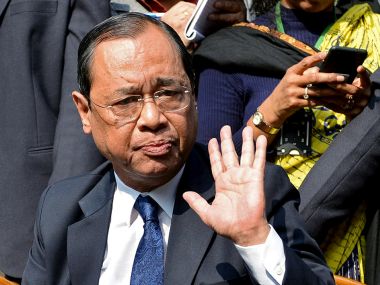Chief Justice Ranjan Gogoi is all set to retire on 17 November as the 46th head of Indian judiciary. With a reputation as a no-nonsense administrator, in his tenure, he has given judgment on some of the most iconic cases in Indian history like that of NRC (National Registry of Citizens), Ayodhya land dispute, entry of women into Sabarimala temple, to name a few. When Justice (retired) Dipak Misra handed over the baton to Gogoi back in 2018, crucial and politically important cases like the Ayodhya land title dispute, the plea challenging the special status of Jammu and Kashmir, and Assam’s NRC case were pending to be taken to their conclusion, all of which have been dealt with as his last working day as the judicial head comes to an end on Friday. He is on the bench for the last time in court number 1 of the Supreme Court on Friday. Court number 1 of the apex court is the courtroom of the Chief Justice of India. Justice Gogoi sat in the bench with chief justice-designate SA Bobde for just four minutes, during which Supreme Court Bar Association president Rakesh Khanna expressed gratitude on behalf of the Bar to the chief justice. An apex court official said that Gogoi would visit Raj Ghat to pay homage to Mahatma Gandhi. He had also visited the Raj Ghat on 3 October last year after taking oath as the CJI. Later in the day, Justice Gogoi will likely to have a video conference with 650 high court judges across the country and 15,000 judicial officers. He is likely to deliver his message to all the judges and judicial officers.
Early Life
The 64-year-old 46th CJI of India is the son of former Assam chief minister Kesab Chandra Gogo and was born in Dibrugarh. He studied history at Delhi University’s prestigious St Stephen’s College and completed his law from Delhi University. He enrolled in Gauhati High Court in 1978, where practised constitutional, taxation and company matters before being transferred to the Punjab and Haryana High Court, where he became its Chief Justice. On 23 April 2012, he was elevated as a Judge of the Supreme Court and on 3 October 2018, he was appointed as Chief Justice of India, succeeding Dipak Misra. He is the first person from the northeast to be appointed to the top post of the judiciary. His appointment came amid media speculations if he would make it to the top post after he had openly criticised Misra’s handling of CBI judge BH Loya’s death case.
Master of the roster?
Gogoi who was the then the second-senior-most member of the Collegium, before being promoted to the post of CJI, had participated in an unprecedented press conference of Supreme Court judges where he raised several problems that in his opinion were ailing the judiciary. However, at the heart of the matter remained the friction over allocation of key cases, and how then CJI, Dipak Misra decided the roster. [caption id=“attachment_6505601” align=“alignleft” width=“380”]  File image of CJI Ranjan Gogoi. Reuters[/caption] The Supreme Court, later held that the CJI was indeed master of the roster and was entitled to allocate cases to whichever judge he presumes fit as part of his administrative duties. However, several questions were raised on the transparency or the so-called arbitrariness of the process, with the four dissenting judges insinuating that the senior-most judges were being kept away from key cases. The four judges — Justices Kurian Joseph, Madan B Lokur, Justice Chelameswar along with Gogoi— released a letter they wrote to Misra, conceding that he was the master of the roster but that was “not a recognition of any superior authority, legal or factual of the Chief Justice over his colleagues”. Gogoi himself was vocal about the way a controversial case relating to the death of a CBI court judge BH Loya was allocated to a Supreme Court bench. He also headed the bench of the top court which had for the first time in its history, faced a camera inside the courtroom for live-streaming of the proceedings .
Important cases
Gogoi has delivered some of the most iconic cases in the Indian judiciary like that of the Ayodhya dispute land case, review judgment in the Rafale case, contempt case against Congress leader Rahul Gandhi, verdict on whether or not the office of CJI comes under the ambit of the Right to Information (RTI) Act, constitutional validity of Finance Act 2017 passed as money bill. Here’s a quick look at some of these cases. Ayodhya title dispute Delivering a unanimous verdict on a case that has long polarised the country and frayed the tapestry of Indian society, a five-judge Constitution Bench of the apex court headed by Gogoi said the faith of Hindus that Lord Ram was born at the site was undisputed, and he is symbolically the owner of the land. The apex court on 9 November settled the seven-decade-long Ram Janmabhoomi-Babri Masjid land dispute with the historic verdict of awarding a Hindu group the ownership of a centuries-old religious site. It ordered the allotment of an alternative piece of five acres of land to the Muslims for a mosque. Sabarimala review petition On 14 November, the Supreme Court said restrictions on women in religious places were not limited to Sabarimala alone and was prevalent in other places of worship as well, as it referred the matter to a seven-judge bench. The court, in a split 3:2 verdict, observed that the case did not only concern the entry of women to the Sabarimala shrine but will have larger ramification on all aspects where religious rights are pitted against principles of gender parity. The apex court said the judgment by a larger seven-judge bench will re-examine various religious issues, including the entry of women into the Sabarimala temple and mosques and the practice of female genital mutilation in the Dawoodi Bohra community. The court did not stay its 28 September 2018 verdict, which had lifted the ban on women of all ages from entering the famous Ayyappa shrine in Kerala. CJI office brought under RTI A five-judge Constitution Bench of the Supreme Court headed by Gogoi on 13 November held that the office of the CJI should be under the ambit of the Right to Information (RTI) Act as it is a public office. However, the majority judgment of the constitution bench held that judicial independence has to be kept in mind while dealing with transparency. “There needs to be a balance and the whole bulwark of upholding it is on the judiciary. The judiciary needs to be protected from such breach,” said Justice NV Ramana. The apex court also ruled that while a recommendation by the Collegium on names of judges can be disclosed, the reasons cannot come under the purview. The judgment was pronounced after the landmark verdict on 10 January 2010, when the Delhi High Court had held that the office of the Chief Justice of India should come within the ambit of the RTI law, saying judicial independence was not a judge’s privilege, but a responsibility cast upon him. Rafale review petition A three-member bench of the Supreme Court dismissed all petitions seeking review of the apex court’s 2018 order in the Rafale fighter jets deal case, holding that the pleas were without merit . [caption id=“attachment_5124691” align=“alignleft” width=“380”]  File image of a Rafale fighter jet. Wikimedia Commons[/caption] In the 14 December 2018 order, the Supreme Court had said that there was no reason to doubt the decision-making process in the procurement of 36 Rafale fighter jets and gave a clean chit to the Narendra Modi-led government at the Centre. The court had also dismissed the plea for a court-monitored probe into alleged regularities in the deal for procurement of the jets. It had also said that it was not their job to go into the issue of pricing of the fighter planes. A contempt petition filed by BJP leader Meenakshi Lekhi against Congress leader Rahul Gandhi for wrongly attributing his ‘chowkidar chor hai’ slogan to the court was also dismissed. “Rahul Gandhi needs to be more careful in future,” the court ruled. “The Court cannot be dragged into a political discourse”, observed Justice SK Kaul, who wrote the judgment for the bench. Lekhi had accused Gandhi of misquoting the 10 April order of the apex court in which it had allowed additional leaked documents to be put on record as evidence in the Rafale case. While he has been in the frontline for some landmark cases, his tenure was not completely awry of controversies.
Sexual assault allegations
A special bench comprising of the Gogoi, Justice Arun Mishra and Justice Sanjiv Khanna convened a sitting on 20 April to discuss a matter which, according to the notice put up in the Supreme Court of India, was “to deal with a matter of great public importance touching upon the independence of the judiciary”. It was later learnt that the matter pertained to the claim of sexual harassment made against Gogoi by a former Supreme Court employee. Media houses including Scroll, The Wire, The Leaflet and Caravan had earlier published an article wherein it was alleged that the CJI had sexually harassed the employee in his premises and thereafter her family was adversely affected in terms of loss of jobs and other such institutional torments. This was mentioned in a sworn affidavit that she submitted to 22 Supreme Court judges. The alleged incident occurred in October 2018. The woman, in her affidavit, said she has since been dismissed from service and claimed to have faced harassment on several other fronts. Earlier this year, Gogoi was given a clean chit in the case. With inputs from agencies


)

)
)
)
)
)
)
)
)



